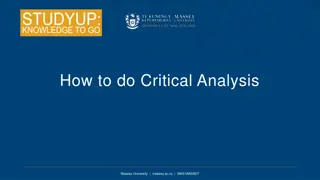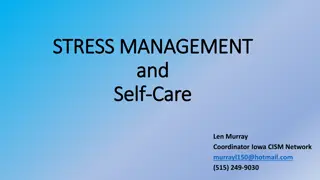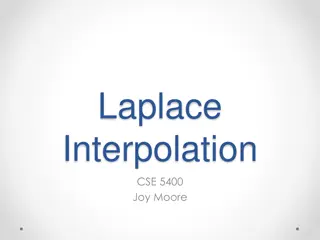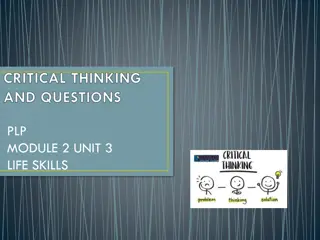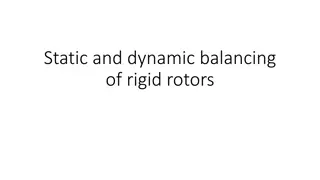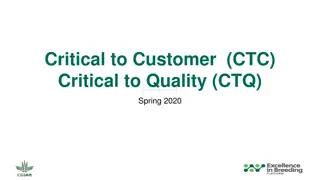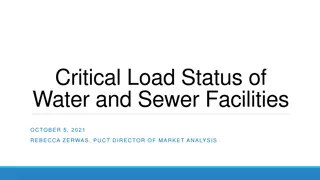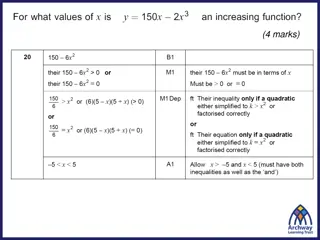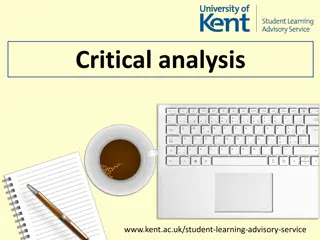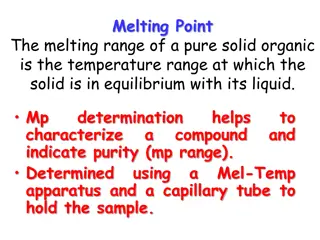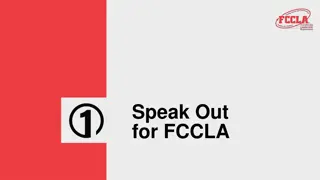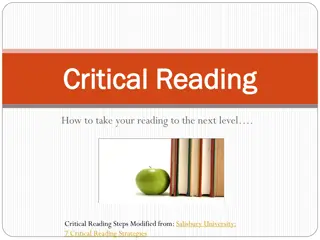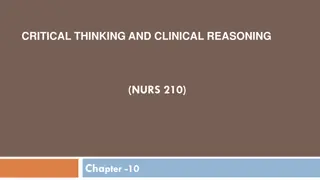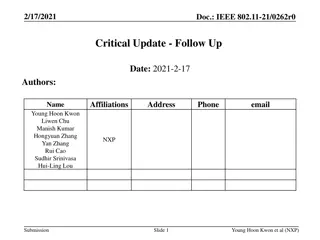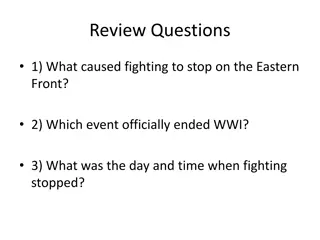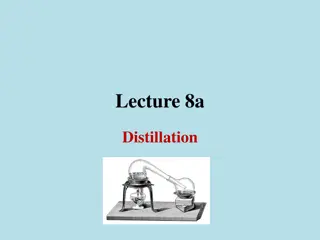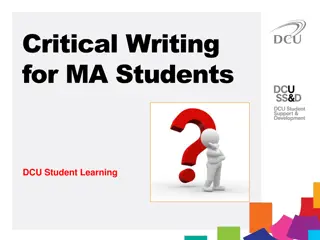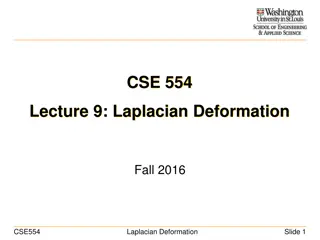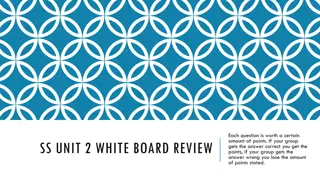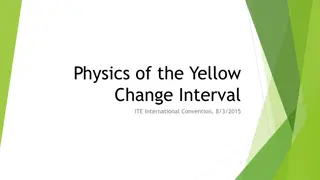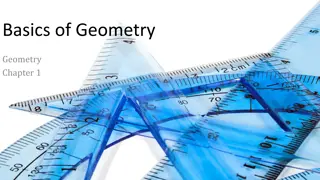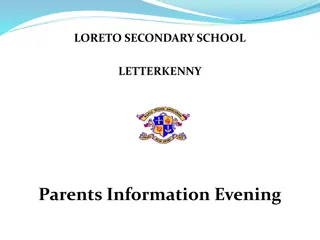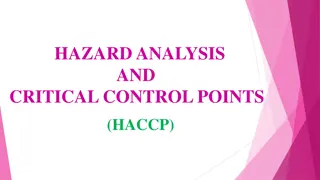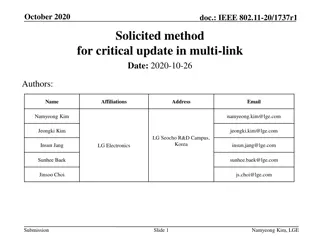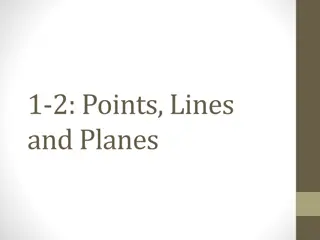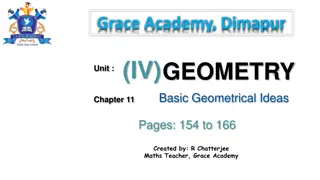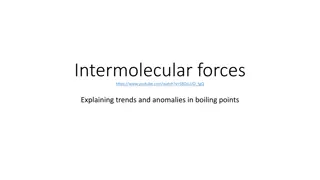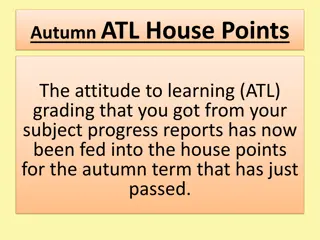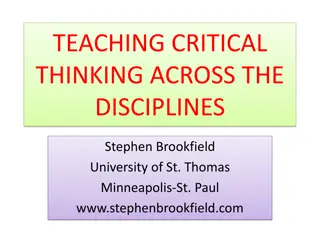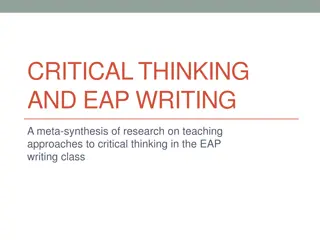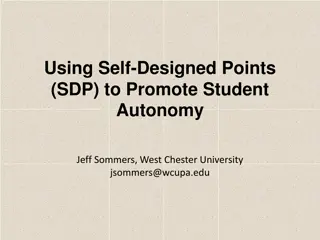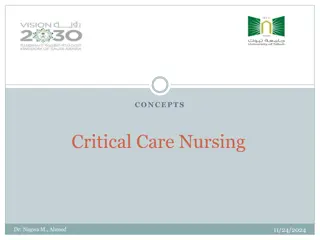Understanding Critical and Non-Critical Incidents in Incident Reporting
Critical incidents, as defined by regulations, are serious events that pose immediate risk to health, safety, or welfare. Non-critical incidents, on the other hand, are minor in nature and do not have serious consequences. Incident reports play a crucial role in documenting occurrences, identifying
0 views • 29 slides
How to do Critical Analysis
Massey University provides valuable insights on critical analysis, distinguishing between description and analysis, evaluating evidence and reasons, and making strong arguments. Critical thinking involves evaluating evidence to reach informed conclusions, surpassing mere understanding. While descrip
0 views • 22 slides
Understanding Critical Incident Stress Management (CISM)
Critical Incident Stress Management (CISM) is crucial for addressing the emotional, physical, and psychological reactions to overwhelming events. This includes definitions of critical incidents, CISM teams, peer support, and crisis response teams. Learn how the International Critical Incident Stress
2 views • 25 slides
Understanding Laplace Interpolation for Sparse Data Restoration
Laplace Interpolation is a method used in CSE 5400 by Joy Moore for interpolating sparse data points. It involves concepts such as the mean value property, handling boundary conditions, and using the A-times method. The process replaces missing data points with a designated value and approximates in
2 views • 13 slides
Enhancing Critical Thinking Skills Through KWHL Chart
Critical thinking entails questioning and seeking more information before accepting ideas. The KWHL chart method is introduced to improve critical thinking skills, encouraging students to note what they know, what they want to learn, how they can learn more, and what they have learned. Engaging in a
0 views • 5 slides
Understanding Rigid Rotor Balancing and Critical Speed
Explore the concepts of static and dynamic balancing of rigid rotors, determining when a rotor can be assumed rigid based on speed, examining Jeffcott rotor critical speed problems, and discussing the simplest model of rotor systems. Learn about rotor imbalance, free vibrations, natural frequency, a
1 views • 29 slides
Understanding Critical to Customer (CTC) and Critical to Quality (CTQ)
Quality is determined by meeting customer needs. Critical to Customer (CTC) Flowdown translates these needs into Critical to Quality (CTQ) aspects. This tool helps organizations identify what is critical to meet customer expectations, serving as a communication tool and guiding improvement projects.
2 views • 10 slides
Understanding Mortgage Points: Calculate, Compare, Decide
Explore the world of mortgage points by learning how to calculate discount points, determine breakeven time, and evaluate if buying points is a wise decision. Through examples, understand how purchasing points can affect your interest rate and overall cost, helping you make informed decisions when f
0 views • 17 slides
Critical Load Status of Water and Sewer Facilities - Filing Requirements and Impacts
Water and wastewater utilities in Texas are required to provide critical load status information to various entities by November 1, 2021. The Senate Bill 3 of the 87th Legislature outlines the filing requirements and impacts on electric utilities and Retail Electric Providers (REPs). The process inv
2 views • 4 slides
Critical Thinking in Islamic Methodology
Explore the concept of critical thinking in Islam, identifying key skills and understanding the importance of constructive criticism. Delve into the methodology of thinking in Islam that transcends superficial understanding, enabling individuals to distinguish between good and bad, correct and incor
2 views • 12 slides
Understanding Points of Inflection in Calculus
Points of inflection in calculus refer to points where the curve changes from convex to concave or vice versa. These points are identified by observing changes in the curve's concavity, and they are not always stationary points. A stationary point can be a point of inflection, but not all points of
0 views • 14 slides
Mastering Critical Analysis in Higher Education
Developing a critical approach is crucial for higher education students to enhance knowledge, problem-solving skills, and idea development. This skill involves analyzing sources, evaluating credibility, and identifying key elements. Explore the differences between descriptive and critical analysis,
1 views • 11 slides
Understanding Melting Points in Organic Chemistry
Melting points play a crucial role in identifying compounds and assessing their purity. The melting range of a pure solid organic compound indicates its equilibrium temperature with its liquid form. Impurities can lower the melting point, causing depression and broadening of the melting range. Mixed
9 views • 13 slides
Exploring Critical Thinking in a Digital Society
Delve into the realm of critical thinking in the modern era, where information is readily available. Discover how easy access to data impacts our ability to think critically. Explore the importance of critical thinking and its application in today's society. Learn about the six-step critical thinkin
0 views • 32 slides
Unlocking Critical Reading Skills: Strategies and Techniques
Enhance your reading comprehension through critical reading practices. Understand the definition of critical reading, its importance in the reading process, and learn practical steps to become a critical reader. Discover how critical reading fits into the C.A.R.E. model and the benefits it brings to
1 views • 26 slides
Enhancing Critical Thinking and Clinical Reasoning in Nursing Practice
Nursing students will gain insights into critical thinking techniques and the integration of clinical reasoning in problem-solving. The importance of critical thinking for identifying client issues, implementing effective interventions, and promoting care outcomes is emphasized. Techniques like crit
0 views • 36 slides
IEEE 802.11-21/0262r0 Critical Updates Discussion Summary
The document discusses critical updates related to IEEE 802.11-21/0262r0, focusing on changes in system information for APs within an AP MLD. It addresses scenarios where non-AP STAs receive Beacon frames with direct inclusion events, potential issues with updating critical information, and proposes
0 views • 9 slides
Woodrow Wilson's 14 Points and the End of WWI
Woodrow Wilson's 14 Points were a series of peace proposals aimed at ending World War I and establishing lasting peace. These points included measures such as ending secret treaties, ensuring freedom of the seas, and promoting self-determination. Wilson's efforts were recognized with the Nobel Peace
3 views • 10 slides
Understanding Distillation: Methods and Factors Affecting Boiling Points
Distillation is a process used to separate liquids based on their boiling points, with methods like simple, fractional, vacuum, and steam distillation. The boiling point of a compound is influenced by factors such as molecular weight and functional groups, where higher weights and polar groups lead
1 views • 15 slides
Understanding Distillation: Boiling Points and Factors
Distillation is a process of vaporizing and condensing liquids to separate components based on boiling points. This method utilizes differences in boiling points of liquid mixtures to achieve separation. Factors influencing boiling points include molecular weight, functional groups, and intermolecul
0 views • 16 slides
Residence Returning Scheme Points Allocation Guidelines
This document outlines the points allocation guidelines for the Residence Returning Scheme, covering categories such as Academic Excellence, University Contributions, Hall-Based Contributions, and Discipline Deduction. It provides detailed criteria for scoring in each category, including GPA points
0 views • 21 slides
Mastering Critical Writing for MA Students: A Guide to Enhancing Academic Skills
Enhance your critical writing skills with this comprehensive guide tailored for MA students. Explore critical thinking, understanding arguments, critical reading, and effective writing techniques. Develop original ideas, create valid arguments, and engage in analysis to boost your academic performan
0 views • 20 slides
Laplacian Deformation in Engineering and Applied Science
Laplacian deformation is a technique used in non-rigid registration to account for shape variance and improve fitting between source and target shapes. This method involves minimizing the distance and distortion terms to achieve accurate alignment. Intrinsic and extrinsic methods are discussed, wher
0 views • 53 slides
Interactive Points-based White Board Review for Social Studies Unit 2
Engage in a points-based review session using images to guess answers related to historical terms such as "Mission," "Abandon," "Treaty," and more. Earn points for correct answers and lose points for incorrect ones as you cover topics like settlements, exploration causes, and historical events.
0 views • 19 slides
Understanding the Physics of Yellow Change Interval at ITE International Convention
Delve into the intricate details of the physics behind the yellow change interval at the ITE International Convention. Explore the critical points, braking points, comfortable stopping distances, and the concept of unimpeded through movements. Learn about the equation for turning vehicles decelerati
0 views • 14 slides
Basics of Geometry: Understanding Points, Lines, and Planes
Explore the fundamental concepts of geometry in this slideshow developed to accompany the textbook "Big Ideas Geometry." Learn about points, lines, and planes, their characteristics, how they are named, and their relationships in space. Gain a clear understanding of line segments, rays, collinear po
0 views • 55 slides
Understanding Convex Hulls in Computational Geometry
Convex hulls play a vital role in computational geometry, enabling shape approximation, collision avoidance in robotics, and finding smallest enclosing boxes for point sets. The convex hull problem involves computing the smallest convex polygon containing a set of points, with extreme points determi
0 views • 119 slides
Loreto Secondary School Parents Information Evening Summary
Loreto Secondary School in Letterkenny conducted a Parents Information Evening covering important topics such as the points system, CAO, HEAR/DARE, UCAS, Leaving Certificate points, grades, bonus points for Mathematics, and matriculation requirements for various institutes. The presentation outlined
0 views • 64 slides
Understanding HACCP Terminology and Necessity
Hazard Analysis and Critical Control Points (HACCP) play a crucial role in ensuring food safety. This article emphasizes the necessity of HACCP, outlines key terminology such as hazards, contamination, control measures, critical control points, and provides insights into HACCP plan, risk assessment,
0 views • 18 slides
Solicited Method for Critical Update in Multi-Link Environments
This document discusses a method for obtaining critical update information for Access Points (APs) within the same Multi-Link Domain (MLD) in IEEE 802.11 standards. It introduces the concept of Change Sequence fields in Beacon and Probe Response frames to indicate changes in system information for o
0 views • 18 slides
Introduction to Points, Lines, and Planes in Geometry
Exploring the fundamental concepts of points, lines, and planes in geometry, including definitions, examples, and postulates. Learn about collinear points, coplanar points, segments, rays, and key postulates in geometry.
0 views • 18 slides
Largest Red-Blue Separating Rectangles Study
This study explores the problem of finding the largest area axis-aligned B-empty rectangle containing n red points and m blue points. The research discusses various extensions to the original problem, such as the Blue Rectangles problem and the Outliers Problem, aiming to achieve efficient solutions
0 views • 20 slides
Understanding Basic Geometrical Ideas in Geometry
Basic Geometrical Ideas in Geometry cover the fundamental concepts of points, lines, and planes. Points are described as having location but no size, lines are infinite sets of points, and collinearity is discussed. The importance of straightness in lines is assumed but not defined. Symbols and nota
0 views • 45 slides
Indian Housing Block Grant 2023 Competitive Priorities
The Fiscal Year 2023 Indian Housing Block Grant (IHBG) Competitive NOFO Training focuses on Soundness of Approach with a maximum of 42 points. Subfactor 3.1 emphasizes IHBG Competitive Priorities, including new housing construction projects, housing rehabilitation projects, acquisition of units, and
0 views • 23 slides
Understanding Boiling Points and Intermolecular Forces
Exploring the relationship between intermolecular forces and boiling points, this content discusses trends and anomalies in boiling points of halogens, isomers with the same molecular formula, molecules with similar Mr, and polar molecules. It explains how molecular size, structure, and interactions
0 views • 5 slides
Autumn ATL House Points Distribution for School Year Groups
The attitude to learning (ATL) grading from subject progress reports has been incorporated into house points for the autumn term. Students receive points based on their ATL grades, with opportunities for additional points. The top-scoring houses are awarded points accordingly for each year group. Th
0 views • 13 slides
Enhancing Critical Thinking: Strategies and Practices Across Disciplines
Explore the multifaceted dimensions of critical thinking in teaching and learning across various disciplines. Uncover the importance of identifying assumptions, the role of different traditions in promoting critical thought, and practical techniques like the Circle of Voices. Discover how critical t
0 views • 16 slides
Enhancing Critical Thinking in EAP Writing: A Meta-Synthesis Study
Investigating the teaching approaches to critical thinking in EAP writing classes, this meta-synthesis research delves into the importance of critical thinking, key issues in the literature review, defining critical thinking, enhancing criticality in academic writing, and understanding critical thin
0 views • 14 slides
Promoting Student Autonomy Through Self-Designed Points (SDP)
Encouraging student autonomy, the approach of Self-Designed Points (SDP) provides students the freedom to earn points by demonstrating personal initiative in various course activities such as reading optional selections, writing responses, and designing online discussions. This student-centered stra
0 views • 11 slides
Understanding Critical Care Nursing: Principles, Definitions, and Types of Units
Critical care nursing involves providing specialized and individualized care to patients with life-threatening conditions. The concept, principles, definitions, and types of critical care units are discussed, emphasizing the importance of early detection, prompt action, and anticipating patient need
0 views • 20 slides

